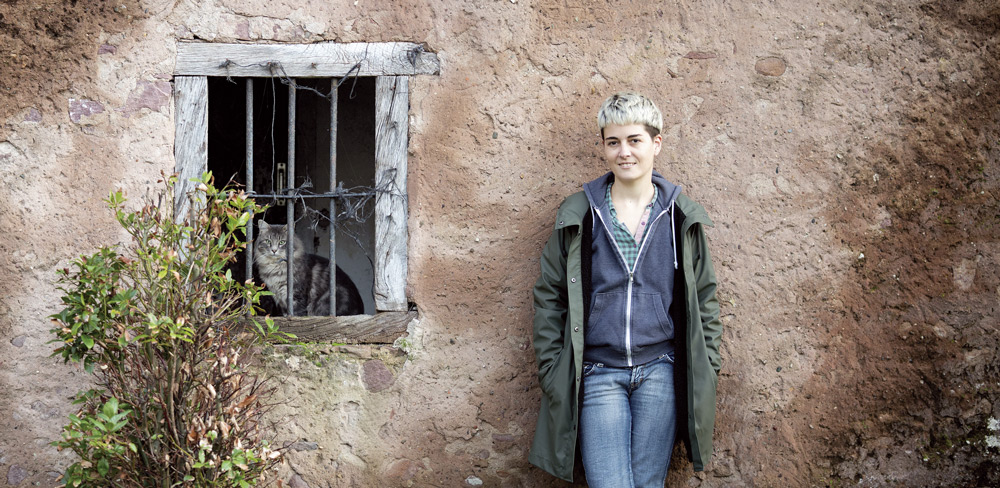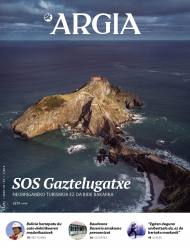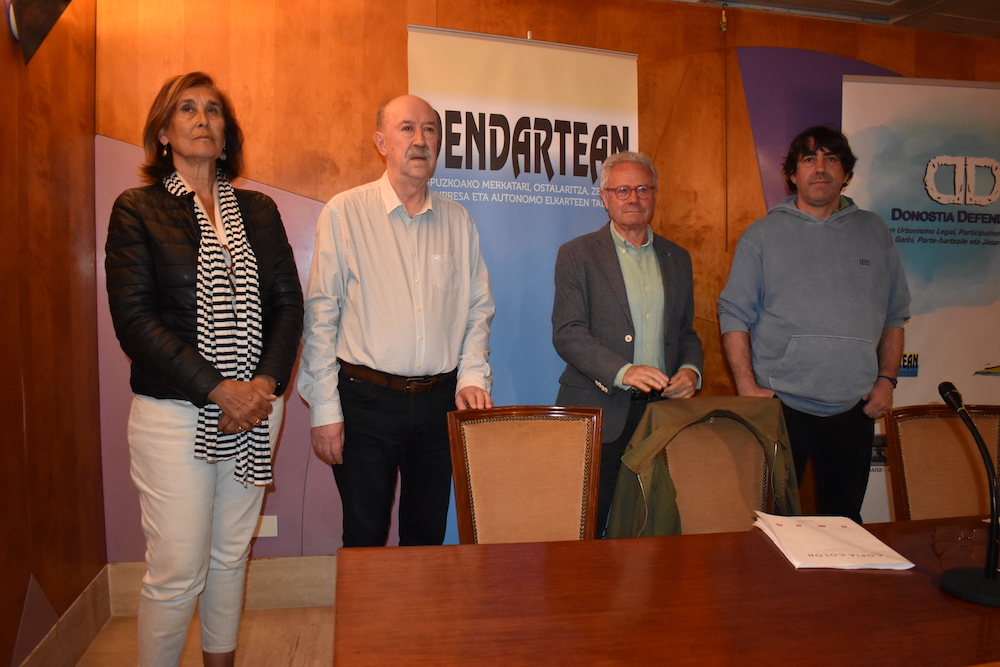"I prefer to buy a pair of shoes for 170 euros and you will see me for ten years"
- The saying goes that the eyes are the mirror of the soul, but according to the shoemaker Harri Arrijuria, the shoes also provide useful information about the character of the person. “In shoes you see the importance of the person: money, quality, style…”. Dani Blanco and I have gone to Elizondo on a bright Thursday afternoon and realized that Arrijuria not only fixes the shoes. We brought home a leather belt that he had made.

Diseinu grafikoa eta argazkilaritza ikasi zuen, eta eremu horretan lan egin zuen bolada batez, baina utzi egin zuen gero, esperientzia txar bat tarteko. Baztanen zapataririk ez zela-eta, Iruñean Mañuetako zapatariarekin ofizioa ikasi eta Kixki-Kaxka zapata-denda ireki zuen 2012an Elizondon. Aste barruan hantxe topatuko duzue, Maurizio Berekoetxea kaleko 12. zenbakian.
In the Feminist Conference of the Basque Country, in the workshop on culture and feminism, we find the two in the group of creators. I did a round to show up and I was astonished to hear that you said that you were a shoemaker.
The truth is, I went to this workshop because I didn't want to stay outside, and I wanted it to be in Euskera, but I didn't know exactly what it was. When they began to say that we would do three groups, of which the thing that came closest to me was creation, and there I stayed. When I showed up, I had my dilemmas.
Yes?
I actually studied graphic design, and then I studied photography, and I realized that if I had introduced myself, I wouldn't have gotten that much attention, but I'm not that anymore, I've taken another path. In any case, I think I draw attention whenever I say I'm a shoemaker, that always. I break schemes in every way, as a young man, as a girl… It’s something that is being lost and people don’t understand.
In this group, did you see similarities with other creators?
I was surprised to see to what extent there is a certain connection, all that you have said and what I live are very similar. The difference lies in how work is judged from the outside. If someone judges me, he will be harmed. On the other hand, it is not the same in your case, if you are tried you will have fewer customers, in my case they are customers, buyers or readers. You can't compare it, but in some things I felt identified.
Do convictions not harm you?
Bad, it's damage to me, but the thing is that I've done a job, to dare and accept myself, and I realize that if someone doesn't accept my job or I'm able to do it, he's the only one hurt: if he doesn't want me to solve something, because I've been born with my foot in the crotch, he's the one who has the problem. I mean, in theory, if she's come to me because she wants to do a repair, she wants or wants to extend her life, and if she doesn't fix it, she's the one she's going to fuck, I don't really care, I prefer not to have a client like that before I have it, and in my empowerment process I've come to tell myself that I prefer to stay with ten clients from 30 to ten and ten.
"I draw attention whenever I say I'm a shoemaker."
Remember any bad experience?
Of course, I am inclined to go through such sentences, they would say, but they put me in one ear and pulled me out of the other. Most of the time it happened to me in the same store or in the same workshop. Some of them gave me enough firewood. I remember it was exaggerated, a man of my father's generation. My father is known to the men of his generation, he is a trucker and travels between weeks. This other man walked into the store and asked me about my father, and I, with all my innocence, told him that my father was on a trip and that if I knew him I would know him. “And your husband?” I realized it. It's happened to me more times. Specifically, when I told him that I was in charge of overtaking the business, that there was no one else, he walked back with his shoes. I thought, What a ridiculous thing!
Have you ever come back?
I think so, but I have bad memory for my faces and it hasn't happened many times to me. It's been more time for the client to recognize me that they don't want a woman to do the repair, but at the same time, as there's no other choice: “Well, you have to do it,” “When will you do it? But do it well, huh? Do it well, because you…”. They tell me these things, and I want to answer. “I don’t have to do it,” but in the end that’s falling into your game. It's your problem, not mine.

So has it been a path to empowering shoe stores?
Yes, zapatería has been a Christian learning for me. I have been around for seven and a half years and today I can speak from another point of view, from a point of view I did not have before. I've had my vicissitudes until last year's winter: an obstacle, learning to face it, another obstacle, learning to face it... Life is like that, but last year's winter was the biggest obstacle and I felt that, if I overcome it, it would be enough. And I'm with that feeling. Since the spring of last year I have been in harmony, very well, and it is no coincidence that I have dared to take the floor in Durango, now I dare say that I am a shoemaker. I used to say that I had learned this and the other, and I have finally finished my shoe. But now I can introduce myself like this.
Let's retire. You say you did other tests. How did you get here?
I went to San Sebastian to study graphic design, and after studying that, I went to work in a photo store, mostly montages, in the photoshop program… It was clear for a long time that I wanted to be a photographer, that was my dream, and for three years I worked in the store and then, I studied at Andoain and did internships with Juantxo Egaña. I did internships and they told me they wanted to welcome me, but they didn't have much work. After a month they got a job and got it. Photographer on the television program Bricomanía. It was the first year in which the camera was introduced, until then only video was made.
What was the experience like?
It was a very difficult year, I suffered a lot. So until then, I was living shrinking, discovering things and seeing messages every time, and that last year I suffered so much, that I started taking the photograph out of my life, I allowed myself to move away from photography for a while. I ended that season of the show, quit the job and went back to Baztan.
And stay.
Until then, I first chose what work I wanted to do and where to live, but I suddenly turned that situation around and chose where to live and what possibilities I was going to take my life forward. There I also had my dilemmas because there is work in Baztan here, but job opportunities are not generally satisfactory, so most move out, so there is quite a slave of life: eight hours at work and car displacements. I was clear that I didn't want that. I wanted to think about how to make life progressing without cars, preferably with local products and all that, a little bit of an anti-system, and when you try to put all that into your life, that automatically causes everything else to come out. He was spinning a lot of his head around and thinking about what he needed to live and be OK at the Baztan. In the end, I was able to round the phrase in one sentence: I had to work with my hands.
With your hands.
Yes, I came to this conclusion. I imagined myself in a vegetable garden or artisan. I didn't have anything in my head exactly, but I had to be with my hands, because when I'm doing something with my hands, painting or whatever, I'm capable of twelve hours in a row, I forget the appetites and everything, that means I connect with myself.

In 2012, you started the Kixki-Kaxka shoe store. What are the difficulties of the business? Today, use and throw, that's how it's done with a lot of things. How does it influence your work?
In our economic system, it makes no sense to have a business like this. If you realize, what the system wants is for people to consume it, and what my business drives is to raise people's awareness. “What do you buy?” I try to extend my life to what you buy entirely. In addition, another part of my work is that I really like to give explanations. A client came and said to me: “I bought it and it has broken me in two days.” Well, I'm going to explain to you why it has been broken and I'm going to give you clues, how to consume...
This winter, what should we take into account when buying shoes?
Well, ... “The Poor’s Sosa to the street twice.” As you can buy shoes at 30 euros, buying for 50 or 70 euros is expensive for people, and a pair of shoes of 70 euros is a chichifu. It can have upper leather, but if it has outsole it will be filth, or if it has a considerable outsole, it will be filth. A good clue is that it has to be over 120 feet, minimum. My philosophy is perhaps to the extreme, but I prefer to buy a pair of shoes of 170 euros and you will see me between 10 and 15 years with these shoes. That is my intention, because I too am aware of producing as little garbage as possible, which has come to me some time ago and I realize that people are now starting to become more aware of it. For a while it was consumed in accordance with a philosophy and I believe that until recently it has remained in the Baztan, but it has suddenly crumbled. Today's young people don't know what quality is, they don't distinguish it.
What kind of customers do you have?
Most adults are mothers, and those over the age of 60, but it doesn't mean they've come by default with their things, most of the time they don't. My mother comes to see me with something from her son, from her husband or from her children's peers. Imagine how far the paths go. It seems that mothers' time does not have the same value as others' time. As far as age and things are concerned, everything we need to know about anybody solves it.
And what kind of work does it do?
It's hard for me to explain. People imagine I fix my broken shoe, but as I work with my skin and I have so many tools, my work has no limits. Today there has been a man walking around with a visor covering his ears. He told me that the wind would lift him up and it would be cold, and I made him a leash to tie him, to his measure.
Remember any special orders?
Many have been exciting. I'm in the shoe store and I transform myself. I feel very good about myself, I feel like I'm in my world. Some customers like how I've treated them, others, for example, what work I've done. Others have given me a gift or made me take it out of the counter to embrace it, to thank it. Now I'm doing a very special, fresh job.
Why?
He's an invalid elderly person. At the age of 20, he got sick, he ended up in the carousel quite quickly, and today he has both legs very deformed. They're not symmetrical, far from it, and they can't catch some of their shoes and move in the way they can. Last year I did so many repairs to him, I realized that actually those repairs didn't lead anywhere, that I wouldn't solve the problem by mentioning a shoe that I had done, that was hurting, and at one point I said to him: “Wouldn’t it be better to make custom shoes?” When he speaks, I don't understand well, but he opened his eyes in a way and put an expression on it, I said: uf! This summer I made him sandals and it's the best thing that has happened to him in this life. Two weeks ago they came to say that now the sandals are not worthwhile, because it is cold, and that I would make her shoes. Now that's what I'm in. It's very concrete, but very nice. This man writes and, for a short story, they have to reward him in the 19th coming in the Condestable of Pamplona [interview held in December 2019], and his dream is to go there with new shoes.
At home, in a single week, my former client cost me three or four euros with the card, and the repetition led me to overcome shame and lengthen the question: "Dora Forgiveness, can I ask you a question? "Yes, of course, tell me"; "I am surprised by the number of people who pay you... [+]
A showcase poster announces that it will soon be out of business, with the possibility of buying the products from the store for the last time. The merchant will tell us that the buying dynamics have been changing when the increase in online transactions has been incorporated... [+]




















